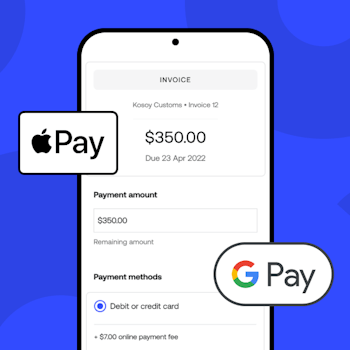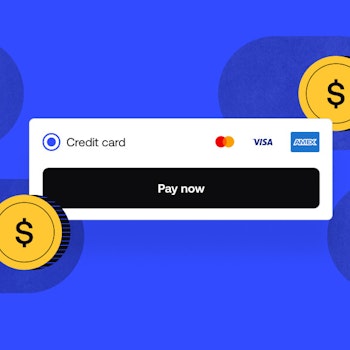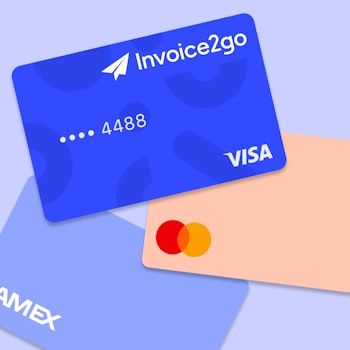
How to become a freelance writer and earn an extra 1k per month
While there are hundreds of ways for aspiring freelancers to make extra money on the side, writing can be a lucrative pursuit if you have the right skillset.
Copywriting is one of the most sought-after skills on freelance marketplaces. Almost every business needs a website, blog, social posts, and marketing collateral—and all these things require the written word.
If you have a way with words, a penchant for prose, can turn a phrase, or have a gift for making complex topics sound like a piece of cake, freelance writing could help you earn an extra 1k every month as a side-hustle. Heck, if you’re good at it and land some great clients, it could even turn your writing skills into a full-time gig.
Take it from this writer—there is plenty of bad writing on the web. With a bit of effort and commitment to learning the ropes of freelance writing, you could be pivotal in a movement to change all that.
At Invoice2go, a Bill.com company, it’s our mission to support freelance and small business success. If you are ready to accept the mission, we’ve got some tips to get you started on how to become a freelance writer.
So you want to learn how to become a freelance writer?
Freelance writing is a great way to make extra money. Even if you don’t have any specific expertise, you’ve got all the information you need at your fingertips if you know how to use Google to your advantage.
Most of the busiest freelance writers are “generalists,” meaning they can write about many different things—including topics they don’t have a lot of experience about. That said, you need to be willing to put in the time and the work to make it good.
If you’re already a decent writer, you’re 90% there. Mastering the format and principles of your target niche (let’s say writing for the web) is pretty easy as there are boundaries, principles, and rules to follow – and plenty of resources out there to tell you what they are.
Whether you solicit local businesses and people you know or sign up on a freelancing platform like UpWork or Fiverr, there are many ways to explore the possibilities. However, all of them have their pros and cons. Knowing what you’re getting into before you dive in will prepare you for what’s ahead. Think of your early efforts as a boot camp, basic training, or “paying your dues.”
What you learn in the early days will set you up for success later on.
Becoming a freelance writer pros and cons
A side-hustle as a freelance writer comes with the same caveats as most any other freelance gig. However, full disclosure—freelance writing has pros and cons.
On the plus side…
Freelance from home—or anywhere else
Work from home—or from the side of a mountain, a beach, or anywhere in the world that has decent internet. Freelance writing gives you some serious freedom that you’d be crazy not to take advantage of; that is, of course, if it’s your one-and-only gig.
Do it in your spare time
If you’re just looking to make an extra 1k a month or so, you can generally do it in your spare time, before or after work, on weekends, or anytime you can squeeze it in.
Minimal investment
You don’t need a lot of fancy equipment. A laptop and an internet connection are generally all you need to get started. Popular word processing software, like Microsoft Word, can be purchased as a subscription for $10 per month, or you can work for free with G-Suite. You will need some sort of computer, but let’s assume you’ve got that.
Getting work is easy
The best way to get started with freelance writing jobs if you don’t know where to start is by signing up for and creating a profile on Fiverr and/or UpWork. There are pros and cons to both sites, which we’ll get into shortly, but having a presence on both sites increases your chances of getting work right away.
The not-so-pretty news about starting a freelance writing career…
It’s not great if you’re easily overwhelmed or disorganized
If you’re the kind of person who likes to “wing it” (like many creatives, let’s be honest), making a living as a freelance writer can be pretty stressful. Managing deadlines is critical, as that’s how you build a good reputation. Late submissions will get you bad reviews and ratings (if you’re on a freelancing site), and if you leave everything to the last minute or underestimate your time, you’ll always be behind the eight-ball.
Ratings and reviews
Further to the last point, you are subject to scrutiny—which means you need to be able to deliver what you promise. There’s a vast field of writing talent out there and plenty of gigs to go around, but you need to be on top of your ratings and keep delivering excellent work to keep them up. If you can’t do that, you won’t be able to advance on the platform and get better-paying gigs.
Not all clients are nice
When working on a platform, you can’t always control who you work with or what you’ll be writing about. Of course, you can refuse jobs, but it doesn’t look good for your ratings if you do that consistently. You’ll find certain people prey on new writers simply because they know they can.
You need to be available and respond promptly
Freelancing carries a lot of expectations. One of them is that you respond to queries in a timely manner. Your response time matters because if you wait too long, the buyer will take that writing job somewhere else. However, if it’s not your only gig, chances are you’ll need to think about establishing hours when clients can contact you.
It’s easy for work-life balance to go out the window
Tons of work is awesome. But it can get out of control quickly if you don’t set boundaries around when and how much you’re going to work. Start slow until you get the hang of it. It’s critical to know your tolerance and stay within it, or you might find yourself burning out before you even get going.
Getting started with your freelance writing career: the road to an extra 1k a month
You’re still here, so that says a lot! The points outlined above are not meant to scare you away—we just think it’s important to be transparent.
The point is, freelance writing is great, but it’s not all Hollywood. But if you approach it with your eyes wide open, it’s a great way to earn some extra dosh. Where it goes from there is entirely up to you.
Seven top tips on how to become a freelance writer successfully
Apply these tips to make the most out of your efforts. Keep in mind; nothing happens overnight. It takes a while to build a clientele. Be patient, be persistent, and don’t quit.
Here are some tips to help you start freelance writing.
1. Seek out education or training
There are plenty of online courses and books that can help you get the basics of freelance writing. Try checking out your local community college first, or search online for something that interests you.
You’ll find all kinds of different classes tailored to specific types of writing, such as creative writing, journalism, screenwriting, fiction, academic, and scientific writing.
Depending on what you hope to do, one of them could speak to you. For example, if you want to try your hand at writing news, journalism might be the ticket. To learn the basics, try a course that focuses on elements of style, storytelling, or writing for advertising. Wherever you end up, all these writing skills are valuable and can be applied to your work.
2. Get out there and start pitching your freelance writing services
Pitching yourself for jobs isn’t always easy, especially if you don’t have a vast sample portfolio under your belt. But everyone needs to gain experience somehow. Start locally, pitch to people you know or to businesses near you. Sometimes your close circle is the best place to start.
When you’re just starting, you can offer discounts or deals to gain experience. You might even work for trade—but be sure you are up-front about the fact that you’re new and would like honest feedback. An editor is a writer’s greatest asset, so always ask for opinions and advice on how to improve your work.
3. Showcase your freelance writing work online
Once you have built up a good portfolio of writing samples, make a webpage to showcase your work. A website is easy to share, and you’ll be able to pitch more people in less time.
Keep track of where your work is published and link to it on your own blog or site. If you write on multiple topics, group your samples into categories so it’s easy for potential clients to find what they’re looking for.
Be sure to include a personal bio and an “about” page that includes topics you’re interested in or have experience with.
Lastly, set up social profiles to maximize your online reach. Check out the writers’ groups on LinkedIn and connect with other writers that align with your style and interests.
4. Networking as a successful freelance writer
You’d be surprised at how many small businesses need freelance writers. Any company with a website needs a blog, and with the staffing shortage everyone’s experiencing these days, it’s likely that the work isn’t getting done.
Offering to take over blog writing duties might be a godsend for some—but you don’t know until you ask.
Make a list of local businesses and have a look at their websites before you call or drop by. Knowing what they need is an excellent way to introduce yourself. You’re there to solve their content problems. You’re local, and you can relate to them because of that.
Working with local businesses is a great way to get started. Once you’re confident about your skills, you can start branching out. Attend networking events, drop off business cards, and speak to people in person—do whatever it takes. Not all will take you up on it, but some will; it’s almost a given.
5. Figure out how to get paid
One of the hardest things about making extra money as a freelance writer is knowing how to price your services.
Content mills like Fiverr have diluted the value of a good copywriter because there are literally thousands of bad writers out there willing to write ridiculous numbers of words for $5.
That being said, you can make money on Fiverr; it just won’t happen right away. The point is, don’t use Fiverr as a gauge of your value. Look more to platforms like UpWork—which is technically a content mill too, but the pay is often much higher.
Once you advance your writing skills and gain some experience, you can make anywhere from 10 to 50 cents per word depending on the client, the niche, and your expertise around the topic.
In the beginning, don’t be too precious about the pay because you need to build a portfolio and gain experience.
Whether you’re working on a platform or with terrestrial clients, getting paid is vital. One good thing about the platforms is that they take care of the payments and send you the money. On the downside, they also take a chunk—anywhere from 20 to 30% of your earnings.
Terrestrial clients pay more, and you get to keep your money—that is, if you’re billing them directly. Services like PayPal make it easy to invoice clients and get paid, but they’ll want their cut too.
Invoice2go is an all-in-one tool that helps you manage your freelancing business, keep track of your finances, invoice customers.
6. Freelance writers: know that the work isn’t always glamorous
We’ve talked a bit about the rigors of freelance writing—but it is work, and it’s not always fun. As a freelancer, especially when you’re just starting as a freelance writer, you might not have a lot of choices about what you write or who you work with.
The best advice we can give you is to take it as it comes. Even the lousy clients and high-pressure jobs can teach you a thing or two, even if it’s just to be able to say “never again.”
Until you get good at it and gain a vast repertoire of random subject matter, you might be putting in long hours and have to endure a lot of revision requests. If you stick it out, you’ll get it.
And hey, it might not be for you, but at least you’ll know. You might even come out of it with an admirable command of how to remove carpet stains or choose the right CPAP machine. Riveting stuff!
7. Expect the unexpected
Freelance writing is never predictable. When you open yourself up to the possibilities, you might discover things about yourself you could never have imagined. If things go well, you might even decide to turn your side-hustle into a full-time gig. If you keep an open mind, focus on the client’s needs, and commit to learning, the sky is truly the limit.
We hope these tips are helpful in showing you how to become a freelance writer. Are you ready to earn an extra 1k per month? It’s totally doable, and we hope this article has given you some insight and inspiration on how you can make it happen.
When it’s time to get serious about your side-hustle, Invoice2go is here to help you keep your business in order. Freelancers use our tools to manage, promote, invoice, and get paid faster, and we’re always looking for ways to do more. Here’s to your freelance writing career taking off!
Related Articles

How to accept credit card payments on Invoice2go in 3 simple steps

Accept payments online via Apple Pay and Google Pay

Must-not-miss write-offs as you wrap up 2022 year-end finances

5 ways accepting credit and debit card payments helps your business stay resilient

4 easy ways to increase cash flow today

What is Small Business Saturday and why is it important?
The features and surprising benefits of a well-designed packing slip
